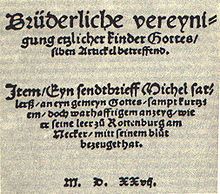Confessions of the Anabaptists
The Anabaptist movement of the Reformation brought forth a whole series of creeds . Reasons for their emergence were on the one hand the theological discussion with the two other wings of the Reformation ( Lutherans / Reformed ) and on the other hand the collection and amalgamation of the various Anabaptist groups. The Anabaptist creeds also served as a basis for defense before ecclesiastical and state courts and inquisition bodies .
Schleitheim article from 1527
Brotherly association of several children of God, concerning seven articles (by Michael Sattler ), also known as the "Schleitheim Confession". The confessional character of the "association" (agreement) is controversial, as it rather bears traits of a church order . However, for a long time and to a large extent it worked like a confession.
Text output (with explanations):
- Sources on the history of the Anabaptists in Switzerland (QGTS), Vol. II, Ed. Heinold Fast , Zurich 1973, pp. 26–36. (Original language!)
- Pamphlets from the First Years of the Reformation (FEJR), Vol. II, Ed. Otto Clemen , Halle 1907–1911, Reprint Nieuwkoop 1967, pp. 277–316. (Original language!)
- The Schleitheimer Anabaptist Confession 1527 , by Beatrice Jenny, Thayngen 1951 = separate print from issue 28, 1951 of the Schaffhauser Contributions to the Fatherland History (SBVG), pp. 5–81. (Original language!)
- The left wing of the Reformation = classic of Protestantism (KlProt), Vol. IV, Ed. Heinold Fast, Bremen 1962. (Modernized in terms of language!)
- A short extract in modern language on the so-called "segregation" can be found in: Hans-Jürgen Goertz, Die Täufer, 2nd edition Munich 1980, pp. 179f.
- The Schleitheim Confession 1527. Introduction, facsimile, translation and commentary , ed. Urs B. Leu, Christian Scheidegger, Zug o. J. [2004] ISBN 3-905351-10-2 (original language [as facsimile] and linguistically modernized).
«Accountability of our religion, emptiness and belief» from 1529–1532? / 1541?
The accountability of our religion, void and belief is a Hutterite creed.
Literature:
- Peter Riedemann : Accountability of our religion, emptiness and belief. From the brothers, as the Hutterites are called, issued by PR [Gmünden 1529–1532] printed in 1565; New prints: Berlin 1870, Verne (USA) 1902, Cotswold (GB) 1938, English London 1950 (information quoted from Walter Troxler: Riedeman, Peter. In: Biographisch-Bibliographisches Kirchenlexikon (BBKL). Volume 8, Bautz, Herzberg 1994, ISBN 3-88309-053-0 , Sp. 303-304. )
- A short excerpt in modern language on community of property can be found in: Hans-Jürgen Goertz: Die Täufer. 2nd edition Munich 1980, p. 180.
Dordrecht Confession from 1632
The Dordrecht Confession ( creed of defenseless and revengeless Christianity ) is a Mennonite creed written in 1632 that was formulated by 51 representatives from mainly Flemish communities in Dordrecht and later by the Mennonites in southern Germany, Alsace and in the newly formed Mennonite churches was adopted in North America.
The Dordrecht Confession must not be confused with the Evangelical Reformed doctrinal rules of Dordrecht from 1618/19.
More creeds
Other creeds followed, e.g. B .:
- Olijftacxken 1630
- Korte Confessie des Jan Cents (at the union between Flemings, Young Frisians and High Germans) in Amsterdam 1639
literature
- Gustav Adolf Benrath: The teaching of the Anabaptists . In: Carl Andresen et al. (Hrsg.): Handbuch der Dogmen- und Theologiegeschichte . Volume II. 2nd edition. Vandenhoeck & Ruprecht, Göttingen 1998, ISBN 3-8252-8039-X , ( UTB for Science - Theology ), pp. 611–664, (lit. and brief overview of numerous Anabaptist confessions!).
